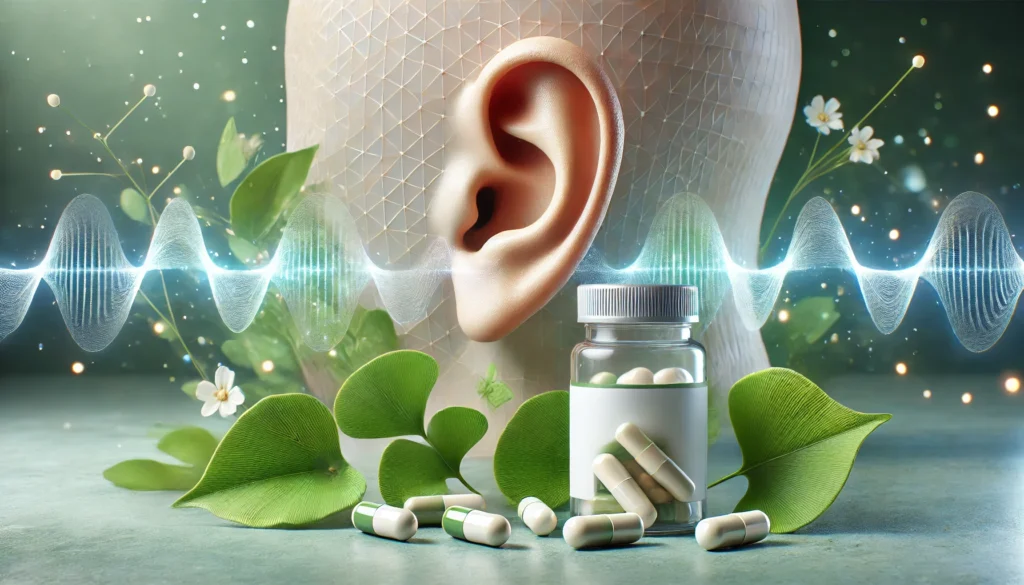Ginkgo Dosage for Tinnitus: What Science Says About Effectiveness, Safety, and Side Effects
Tinnitus, often described as a persistent ringing, buzzing, or whooshing sound in the ears, affects millions worldwide and presents a frustrating challenge for both patients and healthcare providers. Despite the absence of a universally effective cure, many individuals turn to complementary therapies in search of relief. Among these, Ginkgo biloba has attracted widespread interest due to its well-documented effects on cerebral circulation and neuroprotection. As one of the oldest living tree species, Ginkgo biloba has a long-standing history in traditional medicine, particularly in Asia, where it has been used for centuries to address memory deficits, vertigo, and vascular concerns. Its modern use, however, increasingly revolves around its potential to alleviate symptoms of tinnitus. This article explores the role of Ginkgo biloba in tinnitus management, focusing specifically on the recommended ginkgo dosage for tinnitus and the balance between effectiveness and safety, including possible side effects.
You may also like:Ginkgo Biloba Benefits for Creative Thinking: How This Ancient Herb Supports Cognitive Clarity and Focus
While anecdotal reports and patient testimonials have helped popularize Ginkgo as a tinnitus remedy, scientific evidence offers a more nuanced perspective. Understanding how Ginkgo may influence auditory perception requires a grasp of the physiological mechanisms underlying tinnitus. This condition is not a disease in itself but rather a symptom resulting from various underlying causes, including age-related hearing loss, exposure to loud noise, ototoxic medications, and circulatory problems. Ginkgo’s purported effectiveness is thought to stem from its capacity to enhance microcirculation, particularly in the brain and auditory pathways. Additionally, the plant contains antioxidant compounds that may mitigate oxidative stress in the cochlea and auditory nerve—factors increasingly implicated in tinnitus development. These mechanisms suggest a plausible theoretical benefit, but determining the optimal dosage for achieving therapeutic effects without adverse reactions remains a complex task.

The question of appropriate ginkgo dosage for tinnitus continues to generate debate within both the scientific and integrative medicine communities. Clinical trials vary significantly in design, with some studies utilizing doses as low as 120 mg per day, while others have administered up to 240 mg daily. Generally, standardized extracts of Ginkgo biloba—typically containing 24% flavone glycosides and 6% terpene lactones—are used in research settings to ensure consistency. According to several placebo-controlled trials, doses between 120 mg and 240 mg per day have shown modest improvements in tinnitus severity, particularly in cases related to vascular insufficiency. Notably, one of the more widely cited studies, published in the journal Laryngoscope, reported that participants who received 240 mg of standardized Ginkgo extract experienced statistically significant reductions in tinnitus loudness and annoyance compared to placebo. These findings support the idea that dosing is not only central to efficacy but may also determine the likelihood of experiencing Ginkgo biloba tinnitus side effects.
When exploring the safety profile of Ginkgo biloba, it is important to contextualize both its therapeutic potential and its risks. Although considered safe for most healthy adults when used at recommended dosages, Ginkgo is not without adverse effects. Some individuals may experience gastrointestinal discomfort, headache, dizziness, or allergic skin reactions. More concerning are its potential interactions with blood-thinning medications, including aspirin, clopidogrel, and warfarin. Because Ginkgo has mild antiplatelet properties, its concurrent use with anticoagulants may elevate the risk of bleeding. This concern is particularly relevant for tinnitus patients who may already be managing vascular conditions or other chronic illnesses with prescription medications. It is therefore imperative that individuals considering Ginkgo for tinnitus consult with a qualified healthcare provider to evaluate potential risks, especially if they are taking other medications or have underlying health conditions.
Despite the growing interest in Ginkgo biloba for tinnitus, the scientific community remains divided on its overall effectiveness. Some systematic reviews and meta-analyses have found limited or inconclusive evidence to support its use, particularly when studies lack rigorous design or fail to account for tinnitus subtypes. For example, subjective tinnitus caused by stress or neurological factors may not respond as well to Ginkgo as tinnitus resulting from vascular insufficiency. In contrast, other meta-analyses have suggested that standardized Ginkgo extracts, particularly EGb 761, may offer meaningful relief for specific patient populations. The variability in outcomes underscores the importance of individualized treatment approaches and the need for more high-quality clinical trials. While Ginkgo is not a panacea, its relatively low side effect profile and possible benefits make it a reasonable option for individuals seeking adjunctive support.
In the realm of integrative and functional medicine, Ginkgo biloba is often viewed as a multifaceted therapeutic agent rather than a single-target remedy. Its neuroprotective, vasodilatory, and antioxidant effects suggest that it may have broader implications for tinnitus management beyond simply reducing perceived sound intensity. Some researchers speculate that Ginkgo may improve cognitive resilience and emotional regulation in tinnitus patients, many of whom struggle with anxiety, depression, and sleep disturbances as secondary effects. These psychological factors are known to exacerbate tinnitus perception and decrease coping ability. By supporting cerebral blood flow and modulating neurotransmitter activity, Ginkgo could offer indirect yet valuable benefits for overall quality of life. However, more research is needed to substantiate these claims and to differentiate between placebo-driven improvements and genuine pharmacological effects.
Understanding the potential Ginkgo biloba tinnitus side effects also involves recognizing the variability in individual responses. Factors such as age, gender, genetic predispositions, liver enzyme activity, and coexisting health conditions can influence both the metabolism and efficacy of Ginkgo supplementation. For instance, elderly patients with reduced hepatic clearance may accumulate higher levels of active compounds, thereby increasing the risk of adverse reactions. Conversely, younger, metabolically robust individuals may require higher doses to achieve the same effects. These variations further complicate universal dosage recommendations and highlight the importance of personalized healthcare strategies. Monitoring symptoms, tracking progress, and adjusting dosages under professional supervision are essential steps in maximizing benefits while minimizing risks.
From a practical standpoint, individuals interested in using Ginkgo for tinnitus should prioritize evidence-based products. Not all supplements are created equal, and the quality of Ginkgo biloba formulations can vary significantly across brands. Look for products that are standardized to contain 24% flavone glycosides and 6% terpene lactones, as these concentrations align with those used in clinical trials. Additionally, third-party certifications, such as those from NSF International or the U.S. Pharmacopeia (USP), offer added assurance of purity and potency. It is also wise to avoid products containing unnecessary fillers, artificial preservatives, or proprietary blends that obscure exact ingredient quantities. By selecting high-quality formulations and adhering to research-supported ginkgo dosage for tinnitus, users are more likely to experience consistent and meaningful outcomes.
Patient education and expectation management also play critical roles in the use of Ginkgo for tinnitus. While some individuals may report rapid improvement in symptoms within a few weeks, others may require several months of continuous use before noticing changes. This variability can be frustrating, particularly for those hoping for immediate relief. It is important to understand that Ginkgo’s effects, when they occur, are typically gradual and cumulative. Incorporating the supplement into a broader tinnitus management plan—one that may include sound therapy, mindfulness practices, and cognitive behavioral techniques—can enhance overall effectiveness. Educated users who are aware of both the potential benefits and the realistic limitations of Ginkgo are better equipped to navigate their tinnitus journey with patience and discernment.
In recent years, emerging research has begun to explore synergistic effects between Ginkgo biloba and other nutraceuticals. Compounds such as zinc, magnesium, melatonin, and vitamin B12 have all been studied for their potential roles in auditory function and tinnitus reduction. When combined with Ginkgo, these agents may enhance neurovascular support or offer complementary antioxidant protection. However, caution is warranted when stacking supplements, as interactions may increase the risk of Ginkgo biloba tinnitus side effects or blunt the effectiveness of individual components. Consulting with an integrative medicine practitioner can help tailor combination protocols based on specific symptom patterns and health profiles. This personalized approach may represent the next frontier in tinnitus management, bridging the gap between conventional and alternative treatment paradigms.
Ultimately, the decision to use Ginkgo biloba for tinnitus should be informed by a comprehensive understanding of the evidence, coupled with individualized risk assessment and professional guidance. While Ginkgo is not a guaranteed solution, its potential to improve symptoms—especially when used at appropriate dosages—makes it a compelling option for many. By maintaining realistic expectations, prioritizing high-quality products, and remaining attentive to possible side effects, individuals can incorporate Ginkgo into a safe and thoughtful tinnitus management strategy. Continued research, better clinical standardization, and greater public education will further clarify the role of this ancient botanical in the modern healthcare landscape.

Frequently Asked Questions: Ginkgo Dosage for Tinnitus and Related Side Effects
1. Can Ginkgo biloba help with tinnitus caused by stress or anxiety, and how does dosage affect its impact?
While most research has focused on Ginkgo biloba for tinnitus caused by vascular or auditory issues, emerging perspectives suggest that it may offer indirect support for stress-related tinnitus as well. Chronic stress can exacerbate the perception of ringing or buzzing by heightening nervous system arousal. Ginkgo’s mild adaptogenic effects, in addition to its role in cerebral blood flow, may help calm the limbic system, potentially reducing the emotional amplification of tinnitus. In such cases, adjusting the ginkgo dosage for tinnitus should be done carefully, starting at lower doses such as 120 mg daily to assess tolerance and response. It is essential to track symptom changes in relation to stress levels and consult a healthcare provider if tinnitus seems stress-induced.
2. Are there long-term consequences of taking Ginkgo biloba daily for tinnitus relief?
Ginkgo biloba is generally considered safe for prolonged use when taken at clinically supported doses. However, long-term supplementation may raise certain concerns, particularly around bleeding risks and liver enzyme interactions. Some studies indicate that extended use might increase sensitivity to ginkgo biloba tinnitus side effects such as mild gastrointestinal discomfort or headaches. More rarely, liver metabolism interference can occur in sensitive individuals, particularly when combined with other supplements or medications. Long-term users should schedule periodic health checkups to evaluate overall function and assess whether ongoing use remains necessary.
3. How does Ginkgo biloba interact with other tinnitus treatments like sound therapy or cognitive behavioral therapy (CBT)?
Ginkgo biloba does not interfere with standard tinnitus management techniques such as sound therapy or CBT. In fact, some integrative health experts recommend combining these modalities to enhance treatment efficacy. While Ginkgo may help reduce the internal perception of tinnitus through vascular and neuroprotective means, CBT addresses the cognitive and emotional responses associated with the condition. Adjusting the ginkgo dosage for tinnitus in conjunction with therapy might offer synergistic benefits, especially in individuals dealing with tinnitus-related anxiety or insomnia. Practitioners often encourage a holistic approach rather than relying on Ginkgo alone.
4. What are the signs that Ginkgo biloba is not the right option for managing tinnitus?
While many individuals tolerate Ginkgo well, certain symptoms may indicate it isn’t the best fit. If a user experiences persistent dizziness, palpitations, unexplained bruising, or worsened ringing, these could be early signs of intolerance or negative interaction with other medications. These manifestations may also suggest susceptibility to ginkgo biloba tinnitus side effects, particularly among those on anticoagulants or anti-inflammatory drugs. In such cases, it is recommended to stop supplementation and consult a healthcare professional immediately. Tinnitus sufferers with a history of seizures or bleeding disorders should exercise added caution before starting Ginkgo.
5. Is there a difference in tinnitus response between standardized Ginkgo extracts and whole-leaf powders?
Yes, there is a significant difference in how the body responds to various Ginkgo formulations. Most of the clinical research supporting ginkgo dosage for tinnitus uses standardized extracts, such as EGb 761, which contain fixed levels of active flavone glycosides and terpene lactones. Whole-leaf powders or unstandardized formulations may lack potency, consistency, or bioavailability. As a result, users may experience either insufficient therapeutic effects or unexpected reactions. For consistent symptom relief and reduced risk of ginkgo biloba tinnitus side effects, standardized extracts are generally preferred.
6. How do age and health status influence the ideal ginkgo dosage for tinnitus?
Age, metabolic rate, and preexisting health conditions can significantly affect how Ginkgo is processed by the body. Older adults, especially those with slower liver metabolism, may require lower doses to avoid potential side effects. Conversely, younger individuals or those with a high metabolic rate might need the higher end of the dosage range to notice benefits. Tailoring the ginkgo dosage for tinnitus should involve monitoring both the severity of symptoms and the individual’s overall resilience to supplements. Health practitioners often adjust dosages gradually, taking care to avoid triggering ginkgo biloba tinnitus side effects in sensitive populations.
7. Can Ginkgo biloba use for tinnitus improve other auditory symptoms, such as ear fullness or pressure?
While Ginkgo is primarily studied for tinnitus, some anecdotal and early clinical findings suggest that it may also alleviate feelings of ear fullness or pressure, especially when vascular issues are involved. By improving inner ear microcirculation, Ginkgo may help reduce inflammation or fluid retention that contributes to these sensations. However, such benefits are typically secondary and should not be the sole reason for initiating supplementation. An appropriately selected ginkgo dosage for tinnitus may incidentally support broader auditory comfort, but further research is needed to substantiate this potential. Users should still address persistent ear pressure with an audiologist or ENT specialist.
8. What precautions should be taken when combining Ginkgo biloba with other nootropic supplements?
Stacking Ginkgo biloba with other nootropics or herbal compounds requires careful planning to avoid adverse effects or unwanted interactions. Supplements like vinpocetine, bacopa monnieri, or even caffeine may amplify Ginkgo’s effects on blood flow or neurotransmission, potentially altering symptom perception. Overlapping vasodilatory properties could increase the risk of ginkgo biloba tinnitus side effects such as headaches or lightheadedness. To minimize risks, introduce one supplement at a time and space dosages several hours apart. Always consult a healthcare provider before combining cognitive enhancers with Ginkgo.
9. Why do some people respond quickly to Ginkgo biloba for tinnitus, while others notice no improvement?
The variability in individual response often stems from differences in tinnitus etiology, metabolic rate, supplement quality, and genetic factors influencing neurotransmitter sensitivity. Those with tinnitus rooted in vascular issues may respond more favorably than individuals with neurological or idiopathic causes. Additionally, those using high-quality, standardized extracts at an evidence-based ginkgo dosage for tinnitus may be more likely to experience relief than those taking subtherapeutic or inconsistent formulations. Lifestyle factors such as diet, stress, and sleep quality can also modulate outcomes. Personalized approaches that consider these variables tend to yield more consistent results.
10. Could future research improve our understanding of Ginkgo biloba tinnitus side effects and dosage optimization?
Absolutely. While current studies have illuminated many aspects of Ginkgo’s potential, much remains to be explored, especially regarding long-term safety, neurovascular effects, and gene-based responsiveness. Future trials may stratify participants by tinnitus subtype or coexisting health conditions to refine recommendations for ginkgo dosage for tinnitus. Additionally, more rigorous pharmacovigilance could help identify rare but serious ginkgo biloba tinnitus side effects, leading to clearer usage guidelines. Advances in nutrigenomics and wearable auditory tech could also personalize Ginkgo therapy, making it a cornerstone in integrative tinnitus management protocols.

Summary: Balancing Efficacy and Risk When Using Ginkgo Biloba for Tinnitus
For individuals navigating the frustrating and often debilitating experience of tinnitus, the search for relief is both personal and persistent. Ginkgo biloba offers a scientifically plausible and increasingly well-documented option, particularly when vascular or circulatory issues contribute to the condition. Yet, as with any therapeutic intervention, its use must be approached with both curiosity and caution. Determining the right ginkgo dosage for tinnitus involves more than simply following a label—it requires an understanding of the science, the nuances of individual physiology, and the variability in supplement quality.
Though many users tolerate Ginkgo well, awareness of potential Ginkgo biloba tinnitus side effects is critical, especially for individuals taking blood thinners or managing chronic conditions. As more data become available, particularly on standardized extracts like EGb 761, the picture of Ginkgo’s true effectiveness will continue to sharpen. Until then, its use should be considered as part of a comprehensive tinnitus care plan, one that integrates lifestyle modifications, psychological support, and evidence-based supplementation.
Ginkgo biloba will not offer a universal cure, but it does provide a potential path toward improved symptom management and greater quality of life for many tinnitus sufferers. With informed use, guided by both scientific evidence and expert advice, individuals can navigate this ancient remedy with modern clarity and confidence.
Further Reading:
Ginkgo biloba extract in the treatment of tinnitus: a systematic review
Ginkgo biloba in the treatment of tinnitus: An updated literature review
ear ringing remedies, natural tinnitus supplements, herbal treatments for tinnitus, tinnitus and blood circulation, tinnitus support strategies, EGb 761 extract, auditory nerve health, supplements for hearing health, cognitive enhancers for tinnitus, tinnitus and brain fog, vasodilators for ear health, tinnitus relief herbs, hearing support supplements, inner ear circulation, neurovascular supplements, herbal neuroprotection, non-drug tinnitus options, integrative tinnitus therapies, tinnitus coping tools, natural support for ear noise
Important Note: The information contained in this article is for general informational purposes only, and should not be construed as health or medical advice, nor is it intended to diagnose, prevent, treat, or cure any disease or health condition. Before embarking on any diet, fitness regimen, or program of nutritional supplementation, it is advisable to consult your healthcare professional in order to determine its safety and probable efficacy in terms of your individual state of health.
Regarding Nutritional Supplements Or Other Non-Prescription Health Products: If any nutritional supplements or other non-prescription health products are mentioned in the foregoing article, any claims or statements made about them have not been evaluated by the U.S. Food and Drug Administration, and such nutritional supplements or other health products are not intended to diagnose, treat, cure, or prevent any disease.


